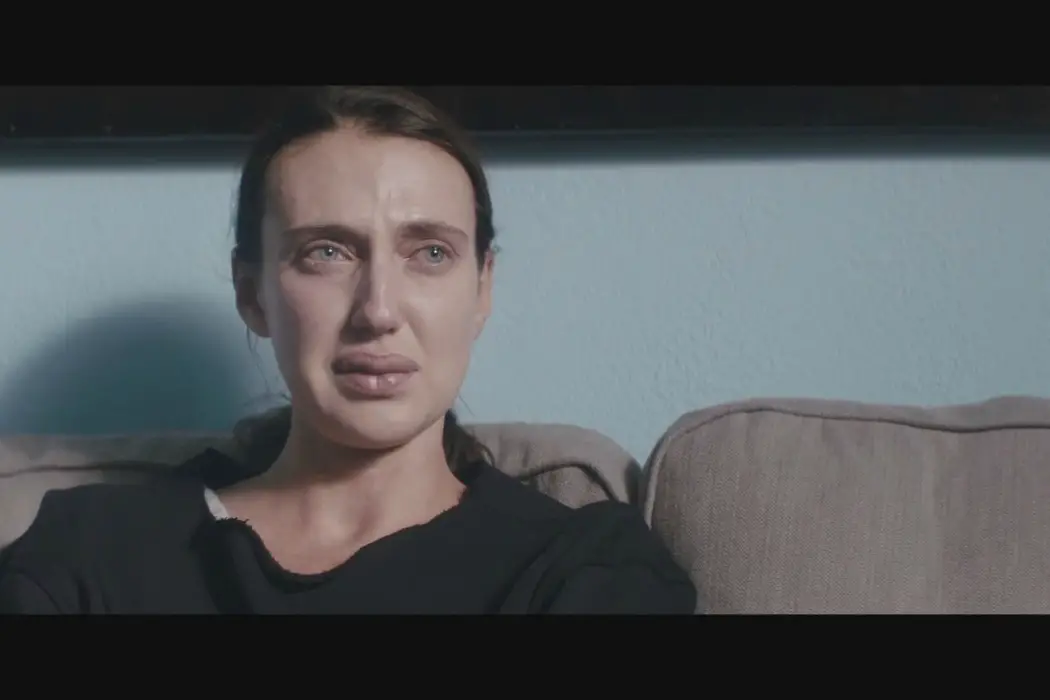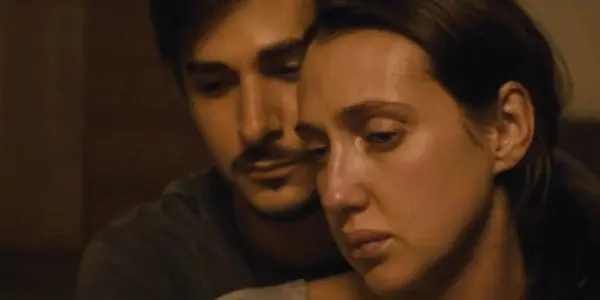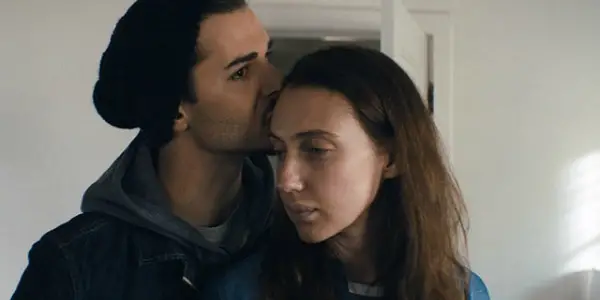ELIZABETH BLUE: Heartfelt, But Undermined By A Nasty Ending

It took me a while to discover the wonderful world…
Twist endings present a problem for a film critic. If the twist is big enough, you can’t ignore it in a write-up. But to even dance around the subject risks spoiling the film for the viewer. The end of Elizabeth Blue presents a further problem, in that the ending completely nullifies everything we’ve already seen happen.
As it comes ninety percent of the way through the film, the sections entitled Plot and The Good, The Bad and The Cliché are written as if the twist ending did not occur. The surprise denouement is addressed directly (but without spoilers) in *That Ending*, and the conclusion. If you already feel like this has told you too much, you should hold off reading the rest of this review until after you’ve seen the movie.
For everyone else, let’s get into it.
Elizabeth Blue
Elizabeth (Anna Schafer), has been in an in-patient facility for some time, diagnosed with schizophrenia, obsessive-compulsive disorder, and anxiety. She is released into the care of her fiancé, Grant (Ryan Vincent).
Life with Elizabeth’s c*cktail of mental illnesses is difficult, to say the least. She suffers from hallucinations that leave her screaming, suicidal impulses, and beneath it all, a profound fear that she’ll never be able to live a normal life. A hideous relationship with her mother (Kathleen Quinlan) doesn’t help matters.

But amongst all the chaos, Elizabeth has two sources of help; her new psychiatrist, Dr Bowman (Adewale Akinnuoye-Agbaje), and Grant, who is always there for her with loving arms and a listening ear.
The Good, The Bad and The Cliché
Vincent Sabella, writer-director of Elizabeth Blue, suffers from mental health problems. Some of the things that Elizabeth goes through in the movie, like the hallucination that a train is coming straight for her, are taken straight from Sabella’s own life. That the writer-director knows first-hand how it feels to live with extreme mental illness gives this film a depth and a texture it wouldn’t otherwise have had.
Depth is also provided by two wonderful central performances from Anna Schafer and Ryan Vincent. Schafer spends the whole movie looking uncomfortable. She’s always moving, and struggles to make eye contact. For most of the time, she looks like she’s on another plain entirely. Her few instances of hysteria, like the train episode, and the hallucination where we meet Tim (Christopher Ashman), are performed particularly well.
Vincent has a far less showy role (though as much of her performance is so inward, it seems wrong to call Schafer‘s part ‘showy’), but he approaches it with an affecting gentleness. He isn’t some robot who always knows entirely what to do; during her hallucinations, the confusion he feels is palpable. But his constant exhibitions of love, as well as the levity he brings as he is trying to calm Elizabeth, are touching.
Elizabeth Blue is clearly made with deep feeling, and that is undoubtedly a strength. However, it is that strength that often drives the film too much into cliché territory, undercutting many scenes that are meant to be emotional high-points.
Too many of the overused cinematic tropes we’ve come to associate with mental anguish are here, sometimes placed right next to each other. There’s the ‘angst shower’, and the ‘angst run’. The overhead shot of a face submerged completely under bathwater. There are plenty of long hard looks in the mirror. Sabella doesn’t come up with any interesting or inventive ways to visually portray Elizabeth’s inner turmoil.

The dialogue also falls back on cliché. ‘Sometimes I wish I could just run away from myself.’ ‘Sometimes I feel cursed, like I’m living in a bad dream that I can’t wake up from. ‘ ‘I know, if we stick together, we can make it through anything’. Schafer and Vincent usually manage to sell these lines, and they are situation-appropriate. It’s just as the hackneyed phrases mount up, it gets harder to ignore how many times we’ve heard them uttered in other movies.
Dialogue problems hit their peak in an egregiously bad monologue, delivered by Elizabeth’s psychiatrist, Dr Bowman. The vomitous nature of this spiel is only a little the fault of Akinnuoye-Agbaje; it’s hard to imagine another way to deliver such cloying prose. To give a quick, sickly taster: Love, is a very strong emotion. It cannot be forced, or created out of thin air. Some people believe we can even teach others to love us. Love is something that can only come naturally, and it finds us when we’re ready for it, but only after we’ve learned to love ourselves.
Even ignoring the cliché, and the way the piano-heavy music surges after he’s said something particularly ‘profound’, the insipid monologue contradicts itself. We are told that some believe love can be taught, and immediately after, that love can only come naturally. It’s as if Sabella has just thrown in every love-related aphorism into a blender, and what emerges is some laughably cheesy, often nonsensical mush.
*That Ending*
As the film progresses, it seems more and more obvious what the final destination will be. And then with ten minutes to go, Sabella pulls the rug out from under us. Usually this would be a good thing. Who wants a predictable ending, right? But in Elizabeth Blue, a film that has been earnest, literally to a fault, this ending comes as a cheap, nasty, and ill-fitting gimmick.
As is the usual case with twist endings, it’s hard to talk about without spoiling. However, it can’t be left unsaid, the finale here doesn’t make any sense. Sabella has set this film up as being about the struggles of a relationship when one of the partners has schizophrenia. Everything we see in the story serves that meaning; that agonising monologue about love, numerous conversations between Elizabeth and Grant, the impetus that Elizabeth has to continue getting well. It even says on the poster, ‘True love can’t be broken by anything, including mental illness‘.

The ending though, renders all of that obsolete. It makes all that we have watched meaningless. It changes the whole raison d’êtrè of the story. It takes away the film’s heft, and makes it purely a puzzle, one that encourages you to watch again to search for clues, rather than invest in the lives of these protagonists.
It’s easy enough to see why Sabella made this decision. We’re dealing with schizophrenia, an illness that leaves its sufferer with an uncertain grasp of reality, and constant feelings of surprise and befuddlement. He seems to want to recreate that feeling, however briefly, for the audience. Perhaps he thought that a fairy-tale ending would be unrealistic.
The ending he goes for though, is so much worse than the fairy-tale would have been. It turns a film that had meaning into a film that doesn’t. All the publicity makes it out to be one thing, and then Elizabeth Blue turns out to be the exact opposite. I can’t imagine how someone with schizophrenia would feel after the final ten minutes. Hopeless, probably. The twist ending certainly makes the final title card, ‘This film is dedicated to everyone affected by mental illness’, look like a sick joke.
Conclusion
For ninety percent of its runtime, Elizabeth Blue is an affecting, heartfelt look at living with schizophrenia. Sure, the dialogue is hokey, bordering on cringeworthy, and there’s too much reliance on cliché, both visual and verbal. But the two central performances are excellent, and you genuinely care about both characters. There’s weight there, even if the execution is less than perfect.
And then the twist happens, and it undoes all the good that came before. It changes the film from a realistic relationship drama, to a gimmick, an ‘oh, did you spot the clues’ charade. Sabella clearly cares deeply about mental health issues, which makes the own goal that is the twist ending particularly galling,
It’s a frustrating finale to a film that really should have gone for the fairy-tale finish.
Have you seen Elizabeth Blue? What did you make of that ending?
Elizabeth Blue is released in the US on September 22nd. For all future release dates, click here.
Does content like this matter to you?
Become a Member and support film journalism. Unlock access to all of Film Inquiry`s great articles. Join a community of like-minded readers who are passionate about cinema - get access to our private members Network, give back to independent filmmakers, and more.
It took me a while to discover the wonderful world of cinema, but once I did, everything just fell into place.













